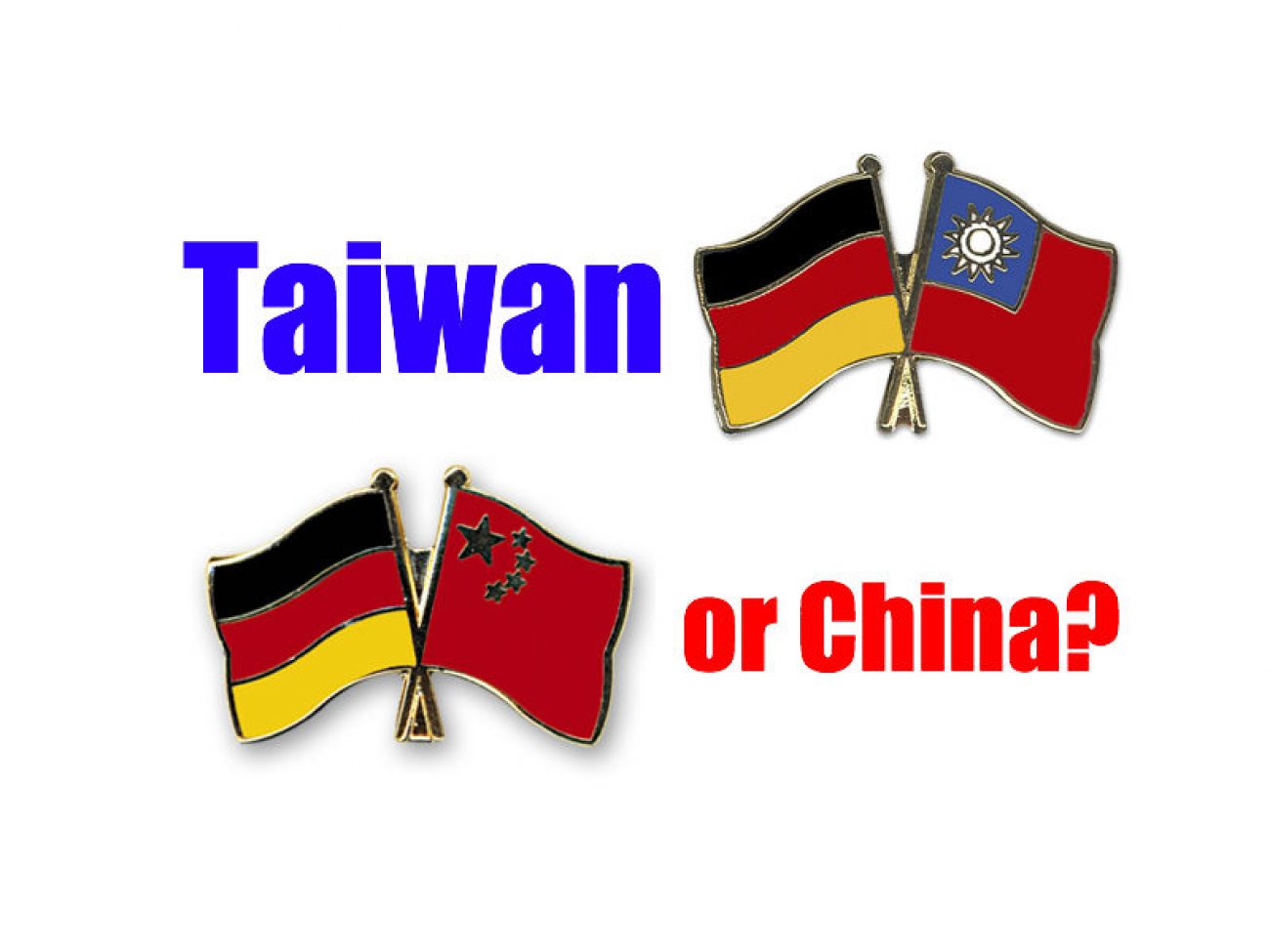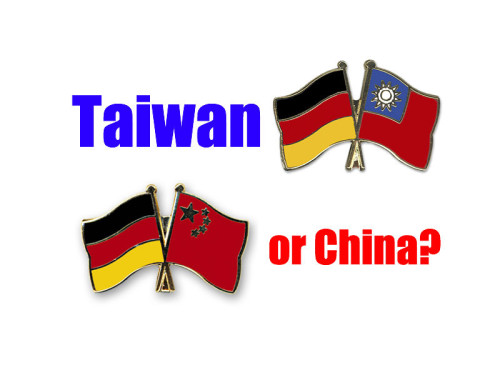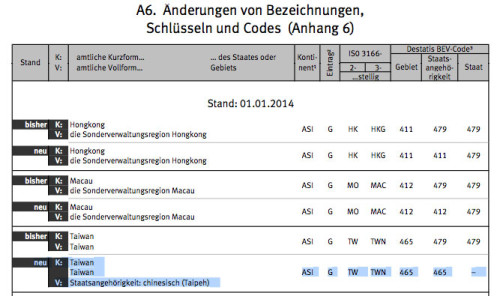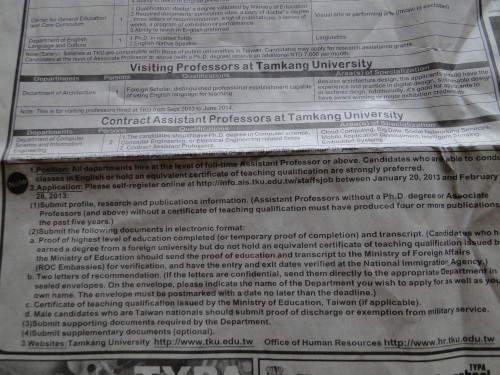When a Taiwanese working in Germany as an intern complained that she had to state her citizenship as „Chinese“ in official documents, her post on the PTT bulletin board quickly attracted a lot of media attention in Taiwan.
Many netizens left comments saying they were shocked or disappointed. Some suspected: This must be an appeasement effect of Taiwan’s non-confrontational China policy.
Because I have been following Germany’s Taiwan policy closely for a few years, I naturally became interested. A first post on my Facebook page attracted more than 70 interesting comments. Feeling encouraged to dig deeper, I contacted some relevant auhorities in Germany to find out what’s really going on.
It may not surprise you that the initial reports were not 100% accurate. But this is a long and complicated story, because it deals with German bureaucracy. Join me on a trip through the „jungle of paragraphs“, as we like to call our red tape.
What happened?
In the PTT post, the author describes how, when she applied for a social security number in Germany (Anmeldung zur Sozialversicherung), she had to fill in the citizenship code 479, which stands for Chinese („chinesisch“) and also for the People’s Republic of China.
She then says she found out that until 2013, Taiwan had the the country code 475, but that apparently had changed. Naturally, she was not happy about this.
German colleagues tried to comfort her, but were not really able to understand why she was so shaken up. She explained that it’s a question of principle to her. They accepted this, but had no way to help her.
What are those country codes?
Like many Taiwanese who were rattled by the news, I quickly found the source of the country codes: An official list curated by Germany’s Federal Statistical Office (Statistisches Bundesamt). „Country and Area Systematics“ (Staats- und Gebietssystematik) is a very long and very detailed document written in cooperation with Germany’s Foreign Ministry (Auswärtiges Amt). It is not directly used for policy, but for statistical purposes, for example to make sure data from different ministries and offices is comparable. But of course it reflects the German government’s official China and Taiwan policies.
You can download the complete country code list as PDF or Excel file (in German).
The latest version is valid from January 1, 2014.
So what is Taiwan’s current country code?
On page 93, you can see the most important information at a glance.
Taiwan has been assigned the following codes:
- Area (Gebiet): 465
- Citizenship (Staatsangehörigkeit): 465
- Citizenship (in written form): Chinese (Taipei) / chinesisch (Taipeh)
- Country (Staat): blank
How does Taiwan compare to China, Hong Kong, Macao?
Take a look!
People’s Republic of China (Volksrepublik China)
- Area (Gebiet): 479
- Citizenship (Staatsangehörigkeit): 479
- Citizenship (in written form): Chinese / chinesisch
Special Administrative Region (Sonderverwaltungsregion) Hong Kong
- Area (Gebiet): 411
- Citizenship (Staatsangehörigkeit): 411
- Citizenship (in written form): Chinese (Hong Kong) / chinesisch (Hongkong)
- Country (Staat): 479
Special Administrative Region (Sonderverwaltungsregion) Macau
- Area (Gebiet): 412
- Citizenship (Staatsangehörigkeit): 412
- Citizenship (in written form): Chinese (Macau) / chinesisch (Macau)
- Country (Staat): 479
So what does this mean?
A few interesting facts you can see clearly:
- Taiwan has its own citizenship code, different from China
- Other than Hong Kong and Macao, Taiwan does not share China’s country code
- In fact, Taiwan has no country code at all
- The citizenship is not written out as „Taiwanese“, but as „Chinese (Taipei)“
So why did the Taiwanese intern in Germany encounter those problems? I will come to that in a minute.
Germany does not consider Taiwan to be a country
Something else becomes clear from that data, and many Taiwanese will not like it, though it’s hardly a surprise: Germany does not consider Taiwan, or the Republic of China for that matter, to be a sovereign country.
That’s not exactly breaking news. Post-WWII-Germany never established diplomatic relations with Taipei, so our government did not need to end them when they recognized the PRC.
Still it’s interesting to read on page 6 that Germany considers Taiwan to be a non-independent area („unselbständiges Gebiet“) like Hong Kong, Macao or the British Overseas Territories.
Page 3 draws an analogy between Taiwanese and Palestinian authorities: Their passports, though not issued by a country with diplomatic relations to Germany, can be used to legally enter Germany.
In Einzelfällen können sich Einreisende und Zuwanderer mit Dokumenten ausweisen, die von keinem von Deutschland diplomatisch anerkannten Staat ausgestellt sind, aber dennoch zur legalen Einreise nach Deutschland berechtigen. Dies ist derzeit z. B. bei Personen der Fall, die sich mit Pässen ausweisen, die von der Palästinensischen Behörde oder von den Behörden in Taiwan ausgestellt sind. Für sie wurden bei der Staatsangehörigkeit gesonderte Einträge geschaffen, bei denen der Verweis zum Staat fehlt.
Germany’s One China Policy
The United States and other countries merely „acknowledge“ Beijing’s One China Principle, and leave open the question if they consider Taiwan to be a part of whatever „China“ is supposed to mean. The German government sadly has gone one step further.
After meeting his Chinese colleague in early 2008, German Foreign Minister Frank-Walter Steinmeier stressed that „Germany’s One China Policy includes: Tibet and Taiwan are part of the Chinese territory.“
Die Bundesregierung hält wie alle Vorgängerregierungen an der Ein-China-Politik fest. Sie beinhaltet die Zugehörigkeit Tibets wie auch Taiwans zum chinesischen Territorium.
Wikileaks publications later revealed that this statement was something the Chinese had specifically asked for in order to mend Sino-German relations after German Chancellor Merkel had received the Dalai Lama in her office.
You can read the whole story in my German blog entry: Wie Deutschlands Regierung vor China gekuscht und eine Demokratie verraten hat
The status quo is constantly changing
Looking through this official country code list, you will notice some interesting changes over the times that, maybe, reflect changes in the German government’s attitude towards Taiwan.
- before 1989: China (Taiwan), citizenship 465, country 465
- 1989 to September 2011: Taiwan, citizenship 465, country 465
- September 2011 to 2014: Taiwan, citizenship 479, country 479
- from January 2014: Taiwan, nationality Chinese (Taipei), citizenship 465, country: blank
So from a Taiwanese POV you could say: The current situation is „better“ than before 2014, but not quite as „good“ as it used to be for a long time before 2011.
I don’t know what caused that change in 2011, and some sources were not able to tell me either. According to Taiwanese media reports, Taipei’s diplomats protested against this decision. Maybe Germany’s Foreign Office had to deal with pressure from China? However, it has largely been reversed.
Bureaucracy moves slowly
So why did they nevertheless tell the Taiwanese intern, in 2014, to use 479? The reason seems to be Germany’s byzantine bureaucracy. When there are changes, it does not mean they are immediately applied everywhere.
German social security, in particular, is a highly complex system of its own and not a direct part of the government apparatus.
I contacted the National Association of Statutory Health Insurance Funds (GKV-Spitzenverband), an organization that you probably never needed to know about. After getting in touch with the person in charge of country codes in social security, I learned that the publications of the Statistical Office are binding for them.
However, first there have to be careful deliberations and decisionmaking. And that takes time.
For example, as you see above, Taiwan lost its 465 code in September 2011. Those changes were only deliberated by the GKV-Spitzenverband on March 6, 2013 and went into effect on December 1, 2013.
Bad luck that the codes were changed again one month later.
When will the social security system react?
This is the reply I got:
Aufgrund der Tatsache, dass das Statistische Bundesamt die Übersicht zur Staats- und Gebietssystematik für das Gebiet Taiwan bereits zum 1. Januar 2014 angepasst hat, hatten wir uns bereits mit dem Federführer der Anlage 8 zum gemeinsamen Rundschreiben „Gemeinsames Meldeverfahren zur Kranken-, Pflege-, Renten- und Arbeitslosenversicherung“, der Bundesagentur für Arbeit, in Verbindung gesetzt und vereinbart, dass in der nächsten Besprechung der Spitzenorganisationen der Sozialversicherung zu Fragen des gemeinsamen Meldeverfahrens die vorgenannte Anlage angepasst wird. Zukünftig werden auch in der Sozialversicherung der Länderschlüssel „465“ und das Länderkennzeichen „TWN“ für Personen aus dem Gebiet Taiwan verwendet.
Bis zu einer Klarstellung gelten allerdings die Ausführungen der aktuellen Anlage 8.
This basically means:
We realize there have been new changes, we will adhere to them, but only after we have had time to sit down and discuss stuff like this with other agencies. As soon as that happens, Taiwanese can use 465 again when filling out our forms. But until then, the old rules still apply.“
What about reality?
In fact, the personnel on the ground often seem to be clueless about what regulations apply. And they can hardly be blamed. So if you are a Taiwanese in Germany, it often depends on who you run into and how much you insist.
It’s also important to know that other branches of bureaucracy (wedding registrations, visa offices…) may handle things differently, because they are part of another system.
In the thread on my Facebook page, you’ll find a few illuminating comments like these:
When we got married, we had lots of trouble in Germany with the correct citizenship of my Taiwanese wife. Based on their database there was only the option Chinese as citizenship. But we insisted that this is not correct and after some discussion we found some solution.
Here comes a report from Munich. I have asked the KVR which is in charge of Aufenthalt in Munich, to revise my nationality from CHN to TWN as ISO-3166 code. Today, 21.08.2014, the BEV-code of Taiwan (465) exists in their system. So I got my ISO-3166 code as TWN.
End of story
So this is it. No big conspiracy against Taiwan, just a slow-moving bureaucracy with convulted decisionmaking processes.
Oh by the way: Taiwan never had the country code 475, as the original PTT posting implied. That’s for Syria.
What are your experiences with Taiwan and bureaucracy abroad? Please leave a comment!
About me
I am a German reporter living and working in Taiwan. Read more English posts on this otherwise mostly German blog. You can also follow me on Twitter, Facebook, Vine, and Google Plus.
Video: What Makes Taiwan so Special?
English posts you might want to have a look at:
- Taiwanese girls dating Western foreigners: What is a Xicanmei?
- If you don’t plan to see Beyond Beauty: Taiwan From Above, here’s why you should
- Who is behind the „foreigners talk about Taiwan“ videos?
- Cheap labor, no rights: Taiwan’s 2nd class foreigners
Das könnte auch interessant sein:
- Deutsche Politiker in Taiwan / „One-China policy has no future“
- Wenn Taiwans Wahlkampf nach Berlin kommt
- Wie Deutschlands Regierung vor China gekuscht und eine Demokratie verraten hat
- Hier spricht ein Mitglied der Bundesregierung über Deutschlands Taiwan-Politik
Powered by YARPP.











11 Antworten
https://www.forumosa.com/taiwan/viewtopic.php?f=29&t=133304&p=1634021#p1634021
Backlink
Auch auf Forumosa.com entstand ein Wirbel, das pöse Deutschland würde Taiwaner jetzt VR-Chinesieren. Ein anderer Poster hat dann auf Dein Blog verlinkt um es aufzuklären und ich selbst war so frei mit Link auch noch mal draus zu zitieren.
Ohne Deine Recherche wäre die Aufregung noch 50 pages weiter gegangen.
Above commentary (German) again in English:
That’s of course a bit uncomfortable but what the heck… life goes on no matter whether it’s 465, 479 or whatever. Concerning Byzantine bureaucracy German could still learn a lesson or two from Taiwan in this regard. That also applies to the cluelessness of official on site and their indifference. I’ve lived here for more than a decade and I know.
Of course, I also am occasionally concerned about the raw deal that Taiwan usually gets in terms of diplomatic recognition. However, these concerns are largely unfounded considering the universal discomfort that China (PRC) causes through its heavy handed handling of democratic developments, just to mention one problem.
So, no need to worry. 465, 479 or any other code – fill it in and get on with your life. You’ll get your social security and you enter a bureaucracy that you can depend on. That can’t be said of Taiwan bureaucracy but that’s another story.
Das ist alles etwas unangenehm aber was soll’s. Das Leben geht weiter – 465, 479 oder was auch immer. Was Buerokratie angehet kann sich Deutschland aber von Taiwan in Sachen byzantinisch noch ein Paar Scheiben abschneiden. Das gilt auch fuer die Ahnungslosigkeit der Beamten vor Ort und ebenso fuer deren Gleichgueltigkeit. Glauben Sie mir… Ich lebe hier seit ungefaehr zwei Jahrzehnten.
Ich mache mir natuerlich auch hin und wieder Sorgen dass Taiwan was diplomatische Anerkennung angeht international unter die Raeder kommt aber diese Befuerchtungen sind im Grunde uebertrieben, nicht zuletzt aufgrund des unterschwelligen, jedoch universellen Misstrauens China (PRC) und seiner intoleranten und schwerfaelligen Haltung gegenueber demokratischen Entwicklungen.
Es besteht ueberhaupt kein Grund zur Sorge hier. Also ob nun 465, 479 oder irgendein anderer Code… ausfuellen und wohlfuehlen. Sie bekommen Ihre Sozialversicherung und werden Bestand einer Buerokratie auf die man sich verlassen kann. Das kann man von Taiwan’s Buerokratie keinesfalls behaupten.
I corrected a careless mistake that happened when I was in a hurry to compose this article. Of course, the PRC has different codes than Taiwan. I corrected it now.
Sorry for the confusion, thank you for pointing it out.
the info you quoted for the codes of People’s Republic of China are actually misplaced with the info of Taiwan.
in your article, it goes like:
People’s Republic of China (Volksrepublik China)
Area (Gebiet): 465
Citizenship (Staatsangehörigkeit): 465
Citizenship (in written form): Chinese (Taipei) / chinesisch (Taipeh)
Country (Staat): blank
But it should be like:
People’s Republic of China (Volksrepublik China)
Area (Gebiet): 479
Citizenship (Staatsangehörigkeit): 479
Citizenship (in written form): chinesisch
Country (Staat): 479
Of course, you are right! Sorry for the stupid mistake and thank you for noticing.
Hm, something went wrong in your article as well – Chinese (Taipei) for People’s Republic of China? I don’t think so… 😉
No, that was a mistake that happened while composing this article. Thanks for telling me!
Dear Mr. Bardenhagen:
I think there’s a mistake here. China’s part looks exactly the same as Taiwan’s. Here I quote:
Taiwan has been assigned the following codes:
Area (Gebiet): 465
Citizenship (Staatsangehörigkeit): 465
Citizenship (in written form): Chinese (Taipei) / chinesisch (Taipeh)
Country (Staat): blank
How does Taiwan compare to China, Hong Kong, Macao?
Take a look!
People’s Republic of China (Volksrepublik China)
Area (Gebiet): 465
Citizenship (Staatsangehörigkeit): 465
Citizenship (in written form): Chinese (Taipei) / chinesisch (Taipeh)
Country (Staat): blank
_________________
Thanks for this detailed report!
Paris Chen
Dear Paris, thank you for pointing that out. Of course, the information should not be identical. I corrected it now.